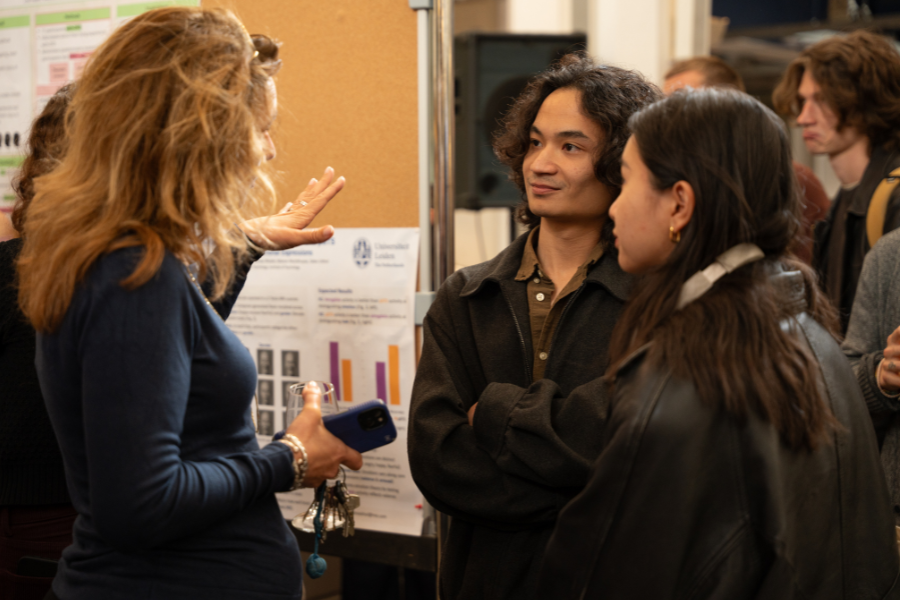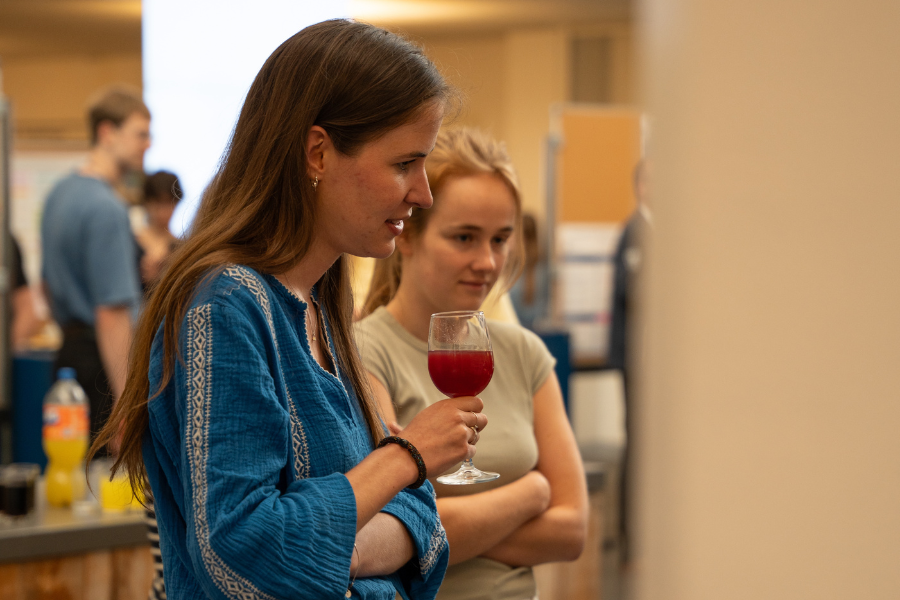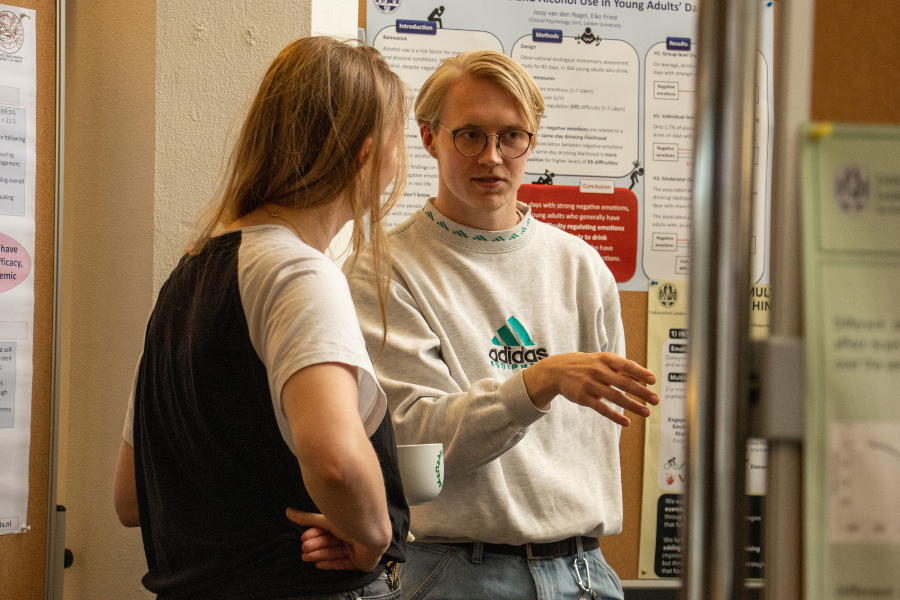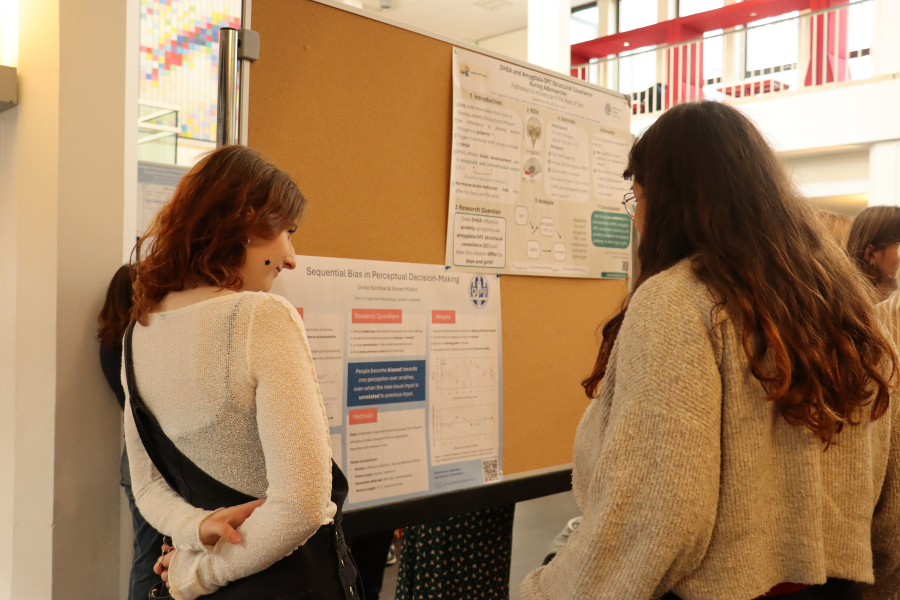
From hormone differences to valid questionnaires: psychology students present their research at the Science Day 2025
How do you measure over-protective parenting? Why are girls more likely to develop anxiety disorders? And do the social skills of therapists really make a difference in treatment outcomes?
These are questions for which psychology students have been trying to find answers. After months of literature studies, data collection and analyses, bachelor’s and master’s honours students present their findings during the Psychology Science Day. Dozens of students stand beside their colourful posters in the central hall of the Peter de la Court building, ready to explain their research to interested visitors.
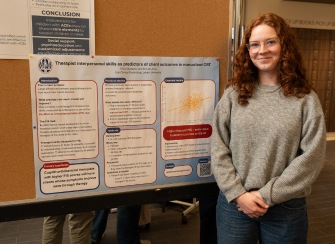
Olivia Gadberry - Clinical and Health Psychology Research Master
Why is there such a big difference in the improvement experienced by patients of different psychotherapists? This could simply be due to the therapist’s interpersonal skills, such as empathy, warmth and the articulate use of language.
When Olivia Gadberry is asked about her research, she launches into an enthusiastic explanation. Her research examines whether the so-called Facilitative Interpersonal Skills (FIS) score of therapists correlates with the outcome of the treatment in cognitive behavioural therapy.
Earlier research showed that high FIS scores correlate with better treatment outcomes, but this has not been studied within cognitive behavioural therapy, a relatively structured and standardised form of treatment. The question is then whether these interpersonal skills also improve the effectiveness of the treatment in cognitive behavioural therapy.
As well as the general effect of FIS, the study also looked at which of the eight domains of FIS skills are most strongly predictive of therapy outcomes. The data has now been collected and is currently being analysed.
If a correlation is found, this can mean that cognitive behavioural therapy may benefit from greater emphasis on social skills in training and in practice. ‘This could have interesting implications for how we train therapists.’
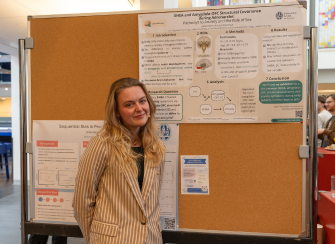
Joëlle Elbers - Cognitive Neuroscience Research Master
How is it that girls have a 60 per cent greater chance of developing an anxiety disorder than boys? Master’s student Joëlle Elbers investigated whether this difference is already biologically visible in early puberty. She focused on the hormone DHEA, which increases during the adrenarche, the first stage of puberty. This hormone influences the development of such brain areas as the amygdala and orbitofrontal cortex, which are also involved in anxiety.
The hypothesis: DHEA, structural covariance of the amygdala and orbitofrontal cortex and anxiety could be related, possibly in a different way in boys from in girls. This could partly explain the difference in the development of an anxiety disorder.
The research did not reveal any significant connection between these factors. Nor were there any significant gender differences. Joëlle Elbers stresses that this does not mean that there is no correlation. The small sample and low levels of anxiety in the group of participants may have played a role, along with age: ‘It is possible that the participants were too young. It may also be that the development of an anxiety disorder only occurs later in puberty.’
Joëlle therefore believes the result has value: ‘It’s part of the picture. It could well be that someone will find a significant link at a later date.’ Her research stresses how early hormonal changes begin and how important it is to have a better understanding of these differences between boys and girls in relation to psychological health.
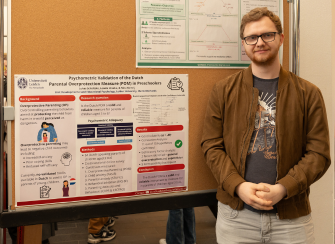
Lukas Schültzke - Clinical and Health Psychology Research Master
As a parent, you want to protect your children from danger in the world outside, but you can go too far with this. Over-protective parenting – where parents protect their child too much against possible dangers – can contribute to greater anxiety and lower independence in children. ‘You can imagine how a child suffers if problems are constantly resolved by their parents.’
But there was no instrument in the Netherlands to properly monitor this behaviour in the parents of young children (3-6 years). Lukas Schültzke examined the validity and reliability of the Dutch version of the Parental Overprotection Measure (POM).
An online questionnaire among 64 parents examined whether the POM correlated with such concepts as over-investment and childhood anxiety. And indeed, 11 of the 15 hypotheses were confirmed, with general over-protection and supervision proving to be the two most important factors.
The study is still ongoing: by using a larger sample, Lukas Schültzke hopes to publish the POM as a legitimate instrument. ‘Increasing attention is being paid to over-protective parenting. With the POM as a reliable and valid measurement tool we can really make a contribution in this area.’


